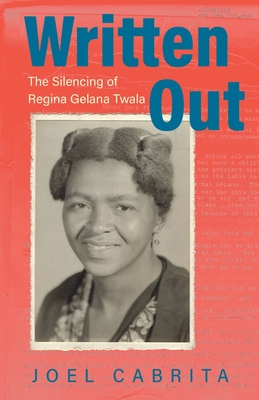Written Out: The Silencing of Regina Gelana Twala

Written Out: The Silencing of Regina Gelana Twala
Systemic racism and sexism caused one of South Africa's most important writers to disappear from public consciousness. Is it possible to justly restore her historical presence?
Regina Gelana Twala, a Black South African woman who died in 1968 in Swaziland (now Eswatini), was an extraordinarily prolific writer of books, columns, articles, and letters. Yet today Twala's name is largely unknown. Her literary achievements are forgotten. Her books are unpublished. Her letters languish in the dusty study of a deceased South African academic. Her articles are buried in discontinued publications.
Joel Cabrita argues that Twala's posthumous obscurity has not developed accidentally as she exposes the ways prejudices around race and gender blocked Black African women like Twala from establishing themselves as successful writers. Drawing upon Twala's family papers, interviews, newspapers, and archival records from Pretoria, Uppsala, and Los Angeles, Cabrita argues that an entire cast of characters--censorious editors, territorial White academics, apartheid officials, and male African politicians whose politics were at odds with her own--conspired to erase Twala's legacy. Through her unique documentary output, Twala marked herself as a radical voice on issues of gender, race, and class. The literary gatekeepers of the racist and sexist society of twentieth-century southern Africa clamped down by literally writing her out of the region's history.
Written Out also scrutinizes the troubled racial politics of African history as a discipline that has been historically dominated by White academics, a situation that many people within the field are now examining critically. Inspired by this recent movement, Cabrita interrogates what it means for her--a White historian based in the Northern Hemisphere--to tell the story of a Black African woman. Far from a laudable "recovery" of an important lost figure, Cabrita acknowledges that her biography inevitably reproduces old dynamics of White scholarly privilege and dominance. Cabrita's narration of Twala's career resurrects it but also reminds us that Twala, tragically, is still not the author of her own life story.
PRP: 268.80 Lei
Acesta este Prețul Recomandat de Producător. Prețul de vânzare al produsului este afișat mai jos.
241.92Lei
241.92Lei
268.80 LeiLivrare in 2-4 saptamani
Descrierea produsului
Systemic racism and sexism caused one of South Africa's most important writers to disappear from public consciousness. Is it possible to justly restore her historical presence?
Regina Gelana Twala, a Black South African woman who died in 1968 in Swaziland (now Eswatini), was an extraordinarily prolific writer of books, columns, articles, and letters. Yet today Twala's name is largely unknown. Her literary achievements are forgotten. Her books are unpublished. Her letters languish in the dusty study of a deceased South African academic. Her articles are buried in discontinued publications.
Joel Cabrita argues that Twala's posthumous obscurity has not developed accidentally as she exposes the ways prejudices around race and gender blocked Black African women like Twala from establishing themselves as successful writers. Drawing upon Twala's family papers, interviews, newspapers, and archival records from Pretoria, Uppsala, and Los Angeles, Cabrita argues that an entire cast of characters--censorious editors, territorial White academics, apartheid officials, and male African politicians whose politics were at odds with her own--conspired to erase Twala's legacy. Through her unique documentary output, Twala marked herself as a radical voice on issues of gender, race, and class. The literary gatekeepers of the racist and sexist society of twentieth-century southern Africa clamped down by literally writing her out of the region's history.
Written Out also scrutinizes the troubled racial politics of African history as a discipline that has been historically dominated by White academics, a situation that many people within the field are now examining critically. Inspired by this recent movement, Cabrita interrogates what it means for her--a White historian based in the Northern Hemisphere--to tell the story of a Black African woman. Far from a laudable "recovery" of an important lost figure, Cabrita acknowledges that her biography inevitably reproduces old dynamics of White scholarly privilege and dominance. Cabrita's narration of Twala's career resurrects it but also reminds us that Twala, tragically, is still not the author of her own life story.
Detaliile produsului











